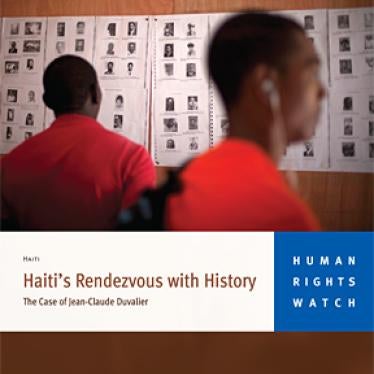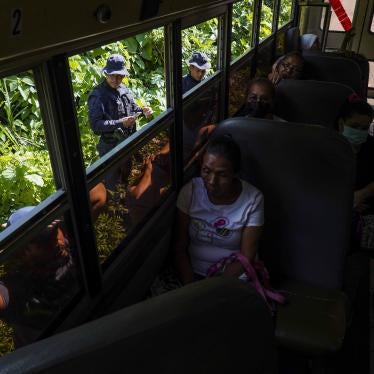(Washington, DC) – A Haitian judge’s decision to dismiss the case against former president-for-life Jean-Claude Duvalier for grave human rights violations ignores Haiti’s international obligation to prosecute such crimes, Human Rights Watch said today.
According to press reports, Investigative Judge Carvés Jean, following the recommendation of Haiti’s state prosecutor, ruled on January 30, 2012, that Duvalier should not stand trial for murder, assassination, and torture, or for extreme corruption under his rule. Jean ruled, however, that Duvalier could stand trial for misappropriation of public funds. Duvalier, who ruled Haiti from 1971 to 1986 and was known as Baby Doc, returned to the country on January 16, 2011, after nearly 25 years in exile. Within days of his return, he was charged with financial and human rights crimes.
“This wrong-headed decision, if upheld on appeal, would entrench Haiti’s culture of impunity by denying justice for Duvalier’s thousands of victims,” said Reed Brody, special counsel for Human Rights Watch. “Haiti has an obligation to its people to investigate and prosecute the grave violations of human rights under Duvalier’s rule.”
During Duvalier’s era, Haiti was marked by systematic human rights violations. Hundreds of political prisoners held in a network of prisons known as the “triangle of death” died from mistreatment or were victims of extrajudicial killings. Duvalier’s government repeatedly closed independent newspapers and radio stations. Journalists were beaten, in some cases tortured, jailed, and forced to leave the country.
Duvalier is also alleged to have embezzled between $300 million and $800 million of assets during his presidency.
A Human Rights Watch report, “Haiti's Rendezvous With History: The Case of Jean-Claude Duvalier,” examined the legal and practical questions surrounding the case and concluded that Haiti had an obligation under international law to investigate and prosecute the grave violations of human rights under Duvalier’s rule. The report, published in April 2011, also addressed Haiti’s capacity to carry out the trial, the question of the statute of limitations, and Duvalier’s personal involvement in alleged criminal acts.
According to media reports, the order issued by Jean found that the statute of limitations could be invoked to prevent the case from going to trial. This ruling contravenes the decisions of the Inter-American Court of Human Rights, by whose judgments Haiti is legally bound. That court has held repeatedly that in light of states’ obligations to investigate and prosecute serious violations under the American Convention on Human Rights, neither statutes of limitations nor amnesty can be applied to gross human rights violations proscribed by international law.
Historical evidence reviewed by Human Rights Watch and included in its April 2011 report establishes that the crimes committed during Duvalier’s rule were within the context of a generalized or systematic attack against the civil population and should be recognized as grave violations of human rights under the jurisprudence of the Inter-American Court for Human Rights. The victims’ lawyers are expected to appeal Jean’s ruling.
“The Duvalier trial could be the most important criminal case in Haitian history,” Brody said. “This ruling is another reminder that Haiti’s justice system has almost always been on the side of the powerful, no matter how gruesome or destructive their crimes. We hope that it will be overturned on appeal.”







